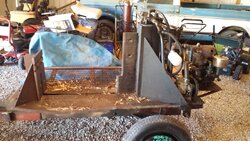I have an old splitter that my grandpa built 35? Years ago, and it needs repowered. I was originally thinking about using a 14 hp kawasaki engine out of one of my old lawn mowers, but stumbled across a 2 cylinder Kubota diesel last night for a reasonable price.
The Kubota is rated at about 13-14 hp, but should add gobs of torque, and go farther on a gallon of fuel. I plan on adding a log lift, 4 way, and redoing everything on the hydraulics, except the cylinder. Anyways, here's what I'm starting out with. Would the diesel motor be a good move?

The Kubota is rated at about 13-14 hp, but should add gobs of torque, and go farther on a gallon of fuel. I plan on adding a log lift, 4 way, and redoing everything on the hydraulics, except the cylinder. Anyways, here's what I'm starting out with. Would the diesel motor be a good move?



